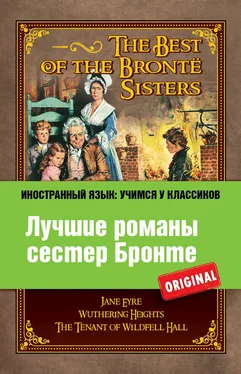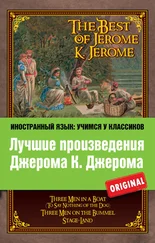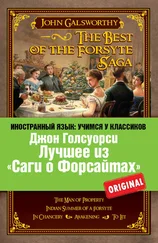But destiny, in the shape of the Rev. Mr. Nasmyth, came between me and Miss Temple: I saw her in her travelling dress step into a post-chaise, shortly after the marriage ceremony; I watched the chaise mount the hill and disappear beyond its brow; and then retired to my own room, and there spent in solitude the greatest part of the half-holiday granted in honour of the occasion.
I walked about the chamber most of the time. I imagined myself only to be regretting my loss, and thinking how to repair it; but when my reflections were concluded, and I looked up and found that the afternoon was gone, and evening far advanced, another discovery dawned on me, namely, that in the interval I had undergone a transforming process; that my mind had put off all it had borrowed of Miss Temple – or rather that she had taken with her the serene atmosphere I had been breathing in her vicinity – and that now I was left in my natural element, and beginning to feel the stirring of old emotions. It did not seem as if a prop were withdrawn, but rather as if a motive were gone: it was not the power to be tranquil which had failed me, but the reason for tranquillity was no more. My world had for some years been in Lowood: my experience had been of its rules and systems; now I remembered that the real world was wide, and that a varied field of hopes and fears, of sensations and excitements, awaited those who had courage to go forth into its expanse, to seek real knowledge of life amidst its perils.
I went to my window, opened it, and looked out. There were the two wings of the building; there was the garden; there were the skirts of Lowood; there was the hilly horizon. My eye passed all other objects to rest on those most remote, the blue peaks; it was those I longed to surmount; all within their boundary of rock and heath seemed prison-ground, exile limits. I traced the white road winding round the base of one mountain, and vanishing in a gorge between two; how I longed to follow it farther! I recalled the time when I had travelled that very road in a coach; I remembered descending that hill at twilight; an age seemed to have elapsed since the day which brought me first to Lowood, and I had never quitted it since. My vacations had all been spent at school: Mrs. Reed had never sent for me to Gateshead; neither she nor any of her family had ever been to visit me. I had had no communication by letter or message with the outer world: school-rules, school-duties, school-habits and notions, and voices, and faces, and phrases, and costumes, and preferences, and antipathies – such was what I knew of existence. And now I felt that it was not enough; I tired of the routine of eight years in one afternoon. I desired liberty; for liberty I gasped; for liberty I uttered a prayer; it seemed scattered on the wind then faintly blowing. I abandoned it and framed a humbler supplication; for change, stimulus: that petition, too, seemed swept off into vague space: “Then,” I cried, half desperate, “grant me at least a new servitude!”
Here a bell, ringing the hour of supper, called me downstairs.
I was not free to resume the interrupted chain of my reflections till bedtime: even then a teacher who occupied the same room with me kept me from the subject to which I longed to recur, by a prolonged effusion of small talk. How I wished sleep would silence her. It seemed as if, could I but go back to the idea which had last entered my mind as I stood at the window, some inventive suggestion would rise for my relief.
Miss Gryce snored at last; she was a heavy Welshwoman, and till now her habitual nasal strains had never been regarded by me in any other light than as a nuisance; to-night I hailed the first deep notes with satisfaction; I was debarrassed of interruption; my half-effaced thought instantly revived.
“A new servitude! There is something in that,” I soliloquised (mentally, be it understood; I did not talk aloud), “I know there is, because it does not sound too sweet; it is not like such words as Liberty, Excitement, Enjoyment: delightful sounds truly; but no more than sounds for me; and so hollow and fleeting that it is mere waste of time to listen to them. But Servitude! That must be matter of fact. Any one may serve: I have served here eight years; now all I want is to serve elsewhere. Can I not get so much of my own will? Is not the thing feasible? Yes – yes – the end is not so difficult; if I had only a brain active enough to ferret out the means of attaining it.”
I sat up in bed by way of arousing this said brain: it was a chilly night; I covered my shoulders with a shawl, and then I proceeded to think again with all my might.
“What do I want? A new place, in a new house, amongst new faces, under new circumstances: I want this because it is of no use wanting anything better. How do people do to get a new place? They apply to friends, I suppose: I have no friends. There are many others who have no friends, who must look about for themselves and be their own helpers; and what is their resource?”
I could not tell: nothing answered me; I then ordered my brain to find a response, and quickly. It worked and worked faster: I felt the pulses throb in my head and temples; but for nearly an hour it worked in chaos; and no result came of its efforts. Feverish with vain labour, I got up and took a turn in the room; undrew the curtain, noted a star or two, shivered with cold, and again crept to bed.
A kind fairy, in my absence, had surely dropped the required suggestion on my pillow; for as I lay down, it came quietly and naturally to my mind. – “Those who want situations advertise; you must advertise in the — shire Herald .”
“How? I know nothing about advertising.”
Replies rose smooth and prompt now: –
“You must enclose the advertisement and the money to pay for it under a cover directed to the editor of the Herald ; you must put it, the first opportunity you have, into the post at Lowton; answers must be addressed to J.E., at the post-office there; you can go and inquire in about a week after you send your letter, if any are come, and act accordingly.”
This scheme I went over twice, thrice; it was then digested in my mind; I had it in a clear practical form: I felt satisfied, and fell asleep.
With earliest day, I was up: I had my advertisement written, enclosed, and directed before the bell rang to rouse the school; it ran thus: –
“A young lady accustomed to tuition” (had I not been a teacher two years?) “is desirous of meeting with a situation in a private family where the children are under fourteen (I thought that as I was barely eighteen, it would not do to undertake the guidance of pupils nearer my own age). She is qualified to teach the usual branches of a good English education, together with French, Drawing, and Music” (in those days, reader, this now narrow catalogue of accomplishments, would have been held tolerably comprehensive). “Address, J.E., Post-office, Lowton, —shire.”
This document remained locked in my drawer all day: after tea, I asked leave of the new superintendent to go to Lowton, in order to perform some small commissions for myself and one or two of my fellow-teachers; permission was readily granted; I went. It was a walk of two miles, and the evening was wet, but the days were still long; I visited a shop or two, slipped the letter into the post-office, and came back through heavy rain, with streaming garments, but with a relieved heart.
The succeeding week seemed long: it came to an end at last, however, like all sublunary things, and once more, towards the close of a pleasant autumn day, I found myself afoot on the road to Lowton. A picturesque track it was, by the way; lying along the side of the beck and through the sweetest curves of the dale: but that day I thought more of the letters, that might or might not be awaiting me at the little burgh whither I was bound, than of the charms of lea and water.
Читать дальше
Конец ознакомительного отрывка
Купить книгу












